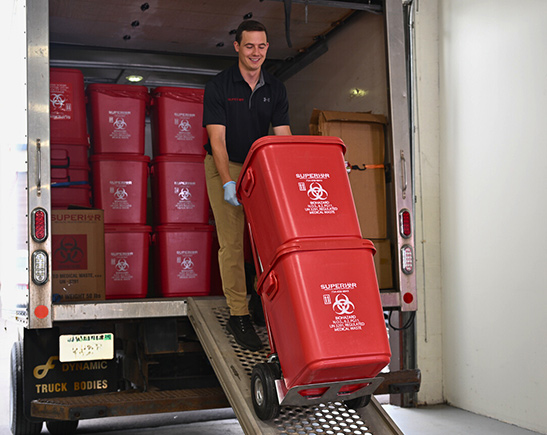Browsing Security: The Crucial Guide to Medical Waste Disposal Best Practices
Browsing Security: The Crucial Guide to Medical Waste Disposal Best Practices
Blog Article
The Relevance of Appropriate Waste Disposal Practices
From the repercussions of inappropriate waste disposal on our environment to the long-lasting ramifications for future generations, the value of adopting sustainable waste administration techniques can not be overemphasized. By discovering the environmental impact of reckless waste disposal, the advantages of reusing initiatives, and the significance of neighborhood involvement in waste decrease initiatives, a much deeper understanding of why correct waste disposal techniques are essential emerges.
Ecological Effect of Improper Disposal
Inappropriate disposal of waste postures a significant threat to the setting due to its destructive impacts on environments and human wellness. When waste is not effectively managed, it can bring about air pollution of the air, soil, and water, creating injury to numerous plant and pet types. click here. Chemicals and toxins from incorrectly disposed waste can leak right into the ground, polluting groundwater resources and influencing the wellness of both wildlife and humans
Furthermore, the buildup of waste in landfills produces greenhouse gases like methane, adding to climate change and global warming. Improper disposal practices also cause littering, which not only degrades the visual value of the setting yet can also harm wild animals via ingestion or entanglement.
To mitigate these ecological influences, it is critical for people and neighborhoods to adopt correct garbage disposal methods such as recycling, composting, and liable unsafe waste disposal. By taking these actions, we can assist safeguard communities, preserve natural deposits, and secure human health and wellness for existing and future generations.
Advantages of Recycling Programs
Regularly taking part in reusing programs provides numerous benefits for both the atmosphere and society overall. Among the crucial benefits of recycling is the preservation of natural deposits. By recycling products such as paper, glass, metal, and plastic, less basic materials need to be removed from the earth, bring about minimized deforestation, mining, and boring activities. This preservation of resources not just aids in preserving eco-friendly balance however likewise adds to lasting development.
Additionally, reusing plays a vital role in minimizing energy consumption and greenhouse gas discharges. The manufacturing of goods from recycled products generally requires much less energy contrasted to producing from virgin resources - medical waste removal near me. Because of this, the carbon impact related to the production process is dramatically decreased, aiding in the fight against climate adjustment
Furthermore, reusing programs develop job chances in the recycling market, advertising financial development and social well-being. By urging the recycling and reuse of products, these programs sustain a round economy that reduces waste generation and takes full advantage of resource effectiveness, inevitably bring about a cleaner, greener future for generations ahead.
Contaminated Materials Monitoring Standards
Executing efficient harmful waste monitoring standards is vital for decreasing ecological and wellness risks connected with the improper disposal of dangerous products - click here. Proper handling, treatment, and disposal of contaminated materials are vital to prevent contamination of dirt, water resources, and air
One trick standard appertains labeling of contaminated materials containers to guarantee secure handling and transportation. Additionally, facilities must adhere to strict storage requirements to avoid leaks, spills, or crashes that can jeopardize human wellness and the atmosphere. Routine training programs for workers on dangerous waste management techniques are additionally crucial to guarantee compliance with laws and advertise a culture of safety.
Furthermore, hazardous waste needs to be set apart based on its properties to prevent chemical reactions that might bring about unsafe circumstances. Carrying out a detailed waste tracking system can aid keep an eye on the motion of unsafe products from generation to disposal, guaranteeing openness and responsibility. By following these standards carefully, companies and sectors can contribute to a safer and cleaner environment for existing and future generations.
Neighborhood Involvement in Waste Reduction
To efficiently resolve the environmental and health risks linked with dangerous waste management, engaging the community in waste decrease campaigns is paramount. Area involvement plays a crucial function in promoting sustainable waste monitoring methods and cultivating a culture of environmental obligation. By enlightening homeowners regarding correct waste partition, recycling, and composting methods, areas can considerably minimize the quantity of waste sent to garbage dumps, consequently minimizing environmental pollution and saving all-natural sources.
Community involvement in waste reduction programs likewise aids in raising recognition regarding the relevance of waste reduction and urges people to adopt environment-friendly behaviors in their daily lives - medical waste removal. Collaborative efforts between local authorities, waste management companies, and community members can lead to the implementation of effective waste reduction strategies customized to the details demands of each area or community
Furthermore, community involvement cultivates a feeling of possession and responsibility among locals, equipping them to take proactive steps in the direction of lowering waste generation and advertising a cleaner, much healthier environment for current and future generations. By interacting in the direction of usual waste decrease goals, areas can make a substantial influence on mitigating the damaging results of incorrect waste disposal practices.

Future of Sustainable Waste Practices
Typical waste disposal approaches, such as landfilling and incineration, are no much longer lasting in the long term due to their significant environmental impacts. Relocating forward, the future of sustainable waste practices lies in accepting a circular economic climate technique, where sources are recycled, recycled, or repurposed to minimize waste generation.
Technological developments play a crucial function fit the future of lasting waste methods. Advanced waste sorting and recycling innovations can assist enhance the efficiency of waste administration processes, enabling the healing of useful resources from waste streams. Furthermore, the adoption of naturally degradable materials and composting methods can help lower the quantity of natural waste winding up in land fills, therefore minimizing greenhouse gas discharges.
Additionally, promoting customer awareness and education on appropriate waste segregation and disposal practices is necessary for driving behavior modification towards sustainability. By cultivating a society of waste reduction, reuse, and recycling, communities can jointly add to a cleaner and healthier setting for future generations.

Final Thought
In conclusion, appropriate waste disposal practices are critical for reducing ecological influence and promoting sustainability. By implementing reusing programs, taking care of contaminated materials correctly, and motivating community involvement in waste reduction efforts, we can function in the direction of a cleaner and healthier environment. It is very important for companies, people, and federal governments to focus on lasting waste practices for the future well-being of our planet.

From the consequences of incorrect waste disposal on our environment to the long-term effects for future generations, the value of taking on lasting waste administration practices can not be overemphasized. By discovering the ecological impact of irresponsible waste disposal, the advantages of reusing efforts, and the importance of area involvement in waste reduction efforts, a much deeper understanding of why proper waste disposal practices are critical arises.
By informing residents concerning appropriate waste segregation, reusing, and composting methods, areas can dramatically minimize the amount of waste sent out to garbage dumps, thereby decreasing environmental pollution and conserving all-natural resources. (click here)
Relocating forward, the future of sustainable waste techniques exists in see here now welcoming a round economic situation strategy, where sources are recycled, reused, or repurposed to lessen waste generation.
Advanced waste sorting and reusing innovations can assist enhance the effectiveness of waste administration processes, allowing for the recovery of beneficial sources from waste streams.
Report this page